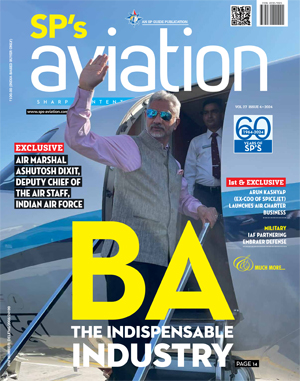INDIAN ARMED FORCES CHIEFS ON
OUR RELENTLESS AND FOCUSED PUBLISHING EFFORTS

SP Guide Publications puts forth a well compiled articulation of issues, pursuits and accomplishments of the Indian Army, over the years

I am confident that SP Guide Publications would continue to inform, inspire and influence.

My compliments to SP Guide Publications for informative and credible reportage on contemporary aerospace issues over the past six decades.
Socked & Shaken

Hike in aviation turbine fuel prices has rattled the finances of airlines—already reeling under a cumulative loss of Rs 4,000 crore—into paroxysms of despair and despondency.
Frayed and straining under the weight of mounting Losses, the tight rope just turned perilously slippery for airlines in India. Hike in aviation turbine fuel (ATF) prices by 18.5 per cent as a fallout of rising international oil prices has plunged airline operators into a major crisis, pitching them up against a seemingly insurmountable hurdle that could pose a serious threat to their very survival.
Administered by government-owned oil companies, the bolt has rattled the finances of airlines—already reeling under a cumulative loss of Rs 4,000 crore—into paroxysms of despair and despondency. In the emerging scenario, business models, especially of low cost carriers, run the risk of being rendered irreversibly unviable. Worse, if one were to consider the signals emanating from the Organization of the Petroleum Exporting Countries (OPEC), it may not be possible to curb the price surge through enhanced global production. The possibility of significant reduction in levies by the central and state governments also appears remote, leaving the airlines with no option but to pass on the burden to the customer. Travellers are, in fact, already experiencing the aftershocks with fares rising meteorically and low cost air travel receding rapidly into the annals of aviation history.
Dismantling of the Administered Pricing Mechanism and the entry of a few private players some years ago notwithstanding, the government continues to dictate price and taxation levels. Through its public sector oil companies, the government still controls the market with near monopoly in the areas of import of crude, refining and marketing. Price levels of finished products within the country are not exposed to market forces.





